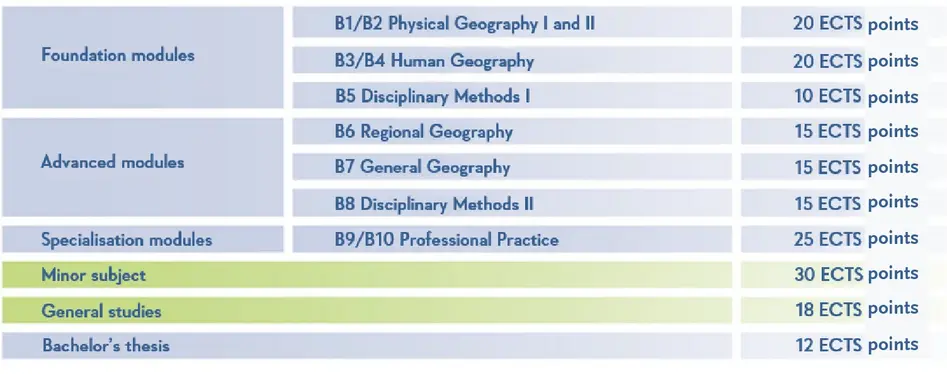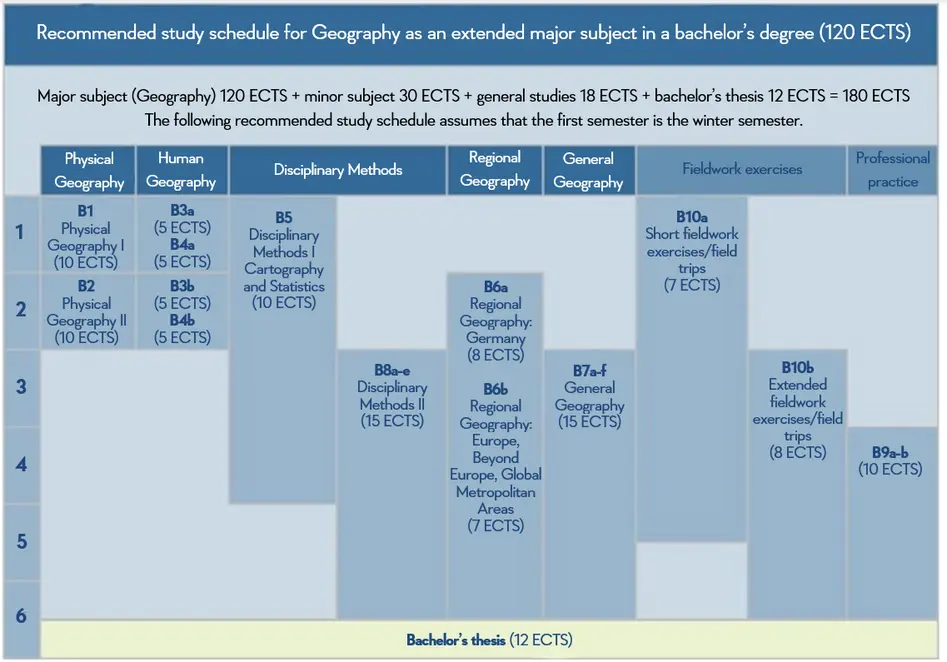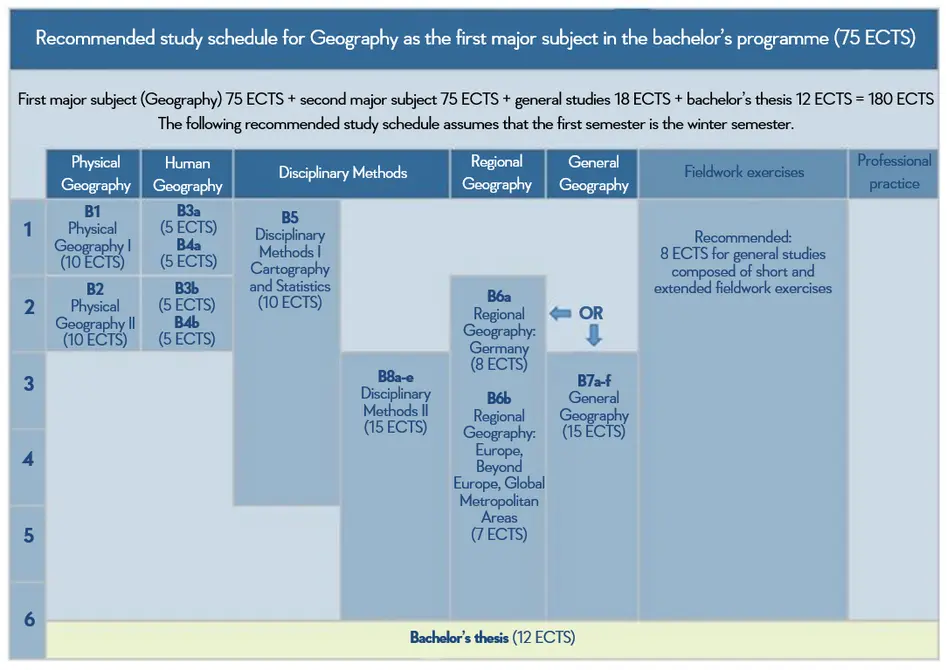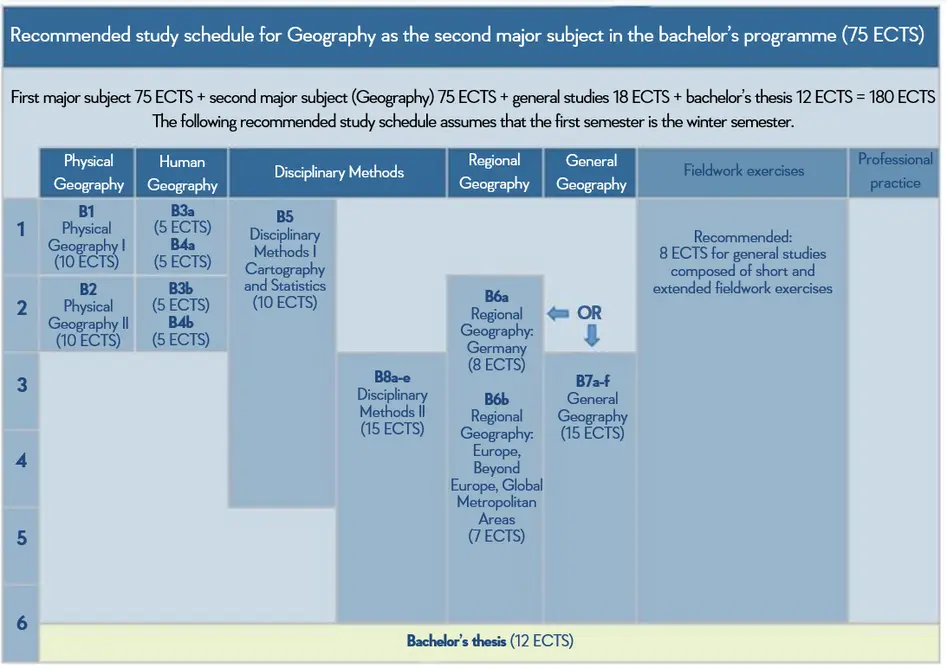Structure and Curriculum
The programme is spread over six semesters and is available as part of a multi-subject programme. The degree programme can be studied as
- An expanded major subject (120 ECTS points)
- A first major subject (75 ECTS points)
- A second major subject (75 ECTS points)
- A minor subject (45 ECTS points)
- A minor subject (30 ECTS points)
Since Geography can also be studied as part of a teacher training programme, it is fully possible to switch between these degree types or do a double degree.
You have the possibility to specialise within the discipline and develop your own academic profile in the following fields:
Geography as an expanded major subject (120 ECTS points)
You can study Geography as an expanded major subject. Your studies are then composed as follows: Major subject (Geography) 120 ECTS points + minor subject 30 ECTS points + general studies 18 ECTS points + bachelor’s thesis (Geography) 12 ECTS points = 180 ECTS points.
You can study the following subjects as your minor subject (30 ECTS points) alongside the extended major in Geography:
General Linguistics | Applied Computer Science | English and American Studies | Archaeology | Business Administration | European Ethnology | European Economic Studies | Protestant Theology | History | Islamic Studies | Jewish Studies | Greek Studies | Latin Studies | Communication Studies | Cultural Heritage Preservation | Art History | Music Education | Education | Philosophy | Political Science | Romance Studies | Slavic Studies | Sociology | Theological Studies
- Physical Geography Ia - Geomorphology (lecture)
- Physical Geography Ib - Soil Geography (seminar)
- Consolidation practical course on Physical Geography (seminar)
- Physical Geography IIa - Climatology (lecture)
- Physical Geography IIb - Hydrology and Vegetation Geography (seminar)
- Consolidation practical course on Physical Geography II (seminar)
- B3a Human Geography: Introduction to Settlements and Populations (lecture)
- B3b Human Geography: Introduction to Economy and Society (lecture)
- B4a Human Geography: Advanced Settlements and Populations (seminar)
- B4b Human Geography: Advanced Economy and Society (seminar)
- Cartography I (seminar)
- Statistics I (seminar)
- B6a Regional Geography: Germany (physical geography component) (seminar)
- B6b Regional Geography: Europe, Beyond Europe and Global Metropolitan Areas (lecture/seminar)
In the B7 General Geography module, you select three of the six possible courses. Here, you can establish individual focus areas.
- B7a Social and Cultural Geography
- B7b Political Geography and Spatial Planning
- B7c Migration and Transition
- B7d Physical Geography
- B7e Historical Geography
- B7f Economic Geography and Globalisation
In the B8 Disciplinary Methods II module, you select three of the five possible courses. Here, you can establish individual focus areas.
- B8a Methods of Physical Geography I
- B8b Methods of Physical Geography II
- B8c Human Geography: Qualitative Methods
- B8d Human Geography: Quantitative Methods
- B8e Historical Geography
- A four-week professional internship
- Project seminar (seminar)
- Extended fieldwork exercise or extended field trip including preparation and follow-up work worth 8 ECTS points
- Short fieldwork exercise or short field trip including preparation and follow-up work worth 7 ECTS points
The bachelor’s thesis should be a piece of independently written work that makes it clear you have subject-specific and methodological knowledge and that you can apply these independently.
Geography as your first major subject (75 ECTS points)
You can study Geography as your first major subject. Your studies are then composed as follows: First major subject (Geography) 75 ECTS points + second major subject 75 ECTS points + general studies 18 ECTS points + bachelor’s thesis 12 ECTS points (Geography) = 180 ECTS points.
You can study the following subjects as your second major subject (75 ECTS points) alongside your first major in Geography:
English and American Studies | Archaeology | German Language, Literature and Culture | History | Islamic Studies | Jewish Studies | Greek Studies | Latin Studies | Communication Studies | Art History | Philosophy | Political Science | Romance Studies | Slavic Studies | Theological Studies
- Physical Geography Ia - Geomorphology (lecture)
- Physical Geography Ib - Soil Geography (seminar)
- Consolidation practical course on Physical Geography (seminar)
- Physical Geography IIa - Climatology (lecture)
- Physical Geography IIb - Hydrology and Vegetation Geography (seminar)
- Consolidation practical course on Physical Geography II (seminar)
- B3a Human Geography: Introduction to Settlements and Populations (lecture)
- B3b Human Geography: Introduction to Economy and Society (lecture)
- B4a Human Geography: Advanced Settlements and Populations (seminar)
- B4b Human Geography: Advanced Economy and Society (seminar)
- Cartography I (seminar)
- Statistics I (seminar)
- B6a Regional Geography: Germany (physical geography component) (seminar)
- B6b Regional Geography: Europe, Beyond Europe and Global Metropolitan Areas (lecture/seminar)
In the B7 General Geography module, you select three of the six possible classes. Here, you can establish individual focus areas.
- B7a Social and Cultural Geography
- B7b Political Geography and Spatial Planning
- B7c Migration and Transition
- B7d Physical Geography
- B7e Historical Geography
- B7f Economic Geography and Globalisation
In the B8 Disciplinary Methods II module, you select two of the five possible classes. Here, you can establish individual focus areas.
- B8a Methods of Physical Geography I
- B8b Methods of Physical Geography II
- B8c Human Geography: Qualitative Methods
- B8d Human Geography: Quantitative Methods
- B8e Historical Geography
The bachelor’s thesis should be a piece of independently written work that makes it clear you have subject-specific and methodological knowledge and that you can apply these independently.
Geography as a second major subject (75 ECTS points)
You can study Geography as a second major subject. Your studies are then composed as follows: First major subject 75 ECTS points + second major subject (Geography) 75 ECTS points + general studies 18 ECTS points + bachelor’s thesis 12 ECTS points = 180 ECTS points.
You can study the following subjects as your first major subject (75 ECTS points) alongside your second major in Geography:
English and American Studies | Archaeology | German Language, Literature and Culture | History | Islamic Studies | Jewish Studies | Greek Studies | Latin Studies | Communication Studies | Art History | Philosophy | Political Science | Romance Studies | Slavic Studies | Theological Studies
- Physical Geography Ia - Geomorphology (lecture)
- Physical Geography Ib - Soil Geography (seminar)
- Consolidation practical course on Physical Geography (seminar)
- Physical Geography IIa - Climatology (lecture)
- Physical Geography IIb - Hydrology and Vegetation Geography (seminar)
- Consolidation practical course on Physical Geography II (seminar)
- B3a Human Geography: Introduction to Settlements and Populations (lecture)
- B3b Human Geography: Introduction to Economy and Society (lecture)
- B4a Human Geography: Advanced Settlements and Populations (seminar)
- B4b Human Geography: Advanced Economy and Society (seminar)
- Cartography I (seminar)
- Statistics I (seminar)
- B6a Regional Geography: Germany (physical geography component) (seminar)
- B6b Regional Geography: Europe, Beyond Europe and Global Metropolitan Areas (lecture/seminar)
In the B7 General Geography module, you select three of the six possible classes. Here, you can establish individual focus areas.
- B7a Social and Cultural Geography
- B7b Political Geography and Spatial Planning
- B7c Migration and Transition
- B7d Physical Geography
- B7e Historical Geography
- B7f Economic Geography and Globalisation
In the B8 Disciplinary Methods II module, you select two of the five possible classes. Here, you can establish individual focus areas.
- B8a Methods of Physical Geography I
- B8b Methods of Physical Geography II
- B8c Human Geography: Qualitative Methods
- B8d Human Geography: Quantitative Methods
- B8e: Historical Geography
Geography as a minor subject (45 ECTS points)
- Physical Geography Ia - Geomorphology (lecture)
- Physical Geography Ib - Soil Geography (seminar)
- Consolidation practical course on Physical Geography (seminar)
- B3a Human Geography: Introduction to Settlements and Populations (lecture)
- B3b Human Geography: Introduction to Economy and Society (lecture)
- B4a Human Geography: Advanced Settlements and Populations (seminar)
- B4b Human Geography: Advanced Economy and Society (seminar)
- B6a Regional Geography: Germany (physical geography component) (seminar)
- B6b Regional Geography: Europe, Beyond Europe and Global Metropolitan Areas (lecture/seminar)
In the B7 General Geography module, you select three of the six possible classes. Here, you can establish individual focus areas.
- B7a Social and Cultural Geography
- B7b Political Geography and Spatial Planning
- B7c Migration and Transition
- B7d Physical Geography
- B7e Historical Geography
- B7f Economic Geography and Globalisation
Geography as a minor subject (30 ECTS points)
You can study Geography as a minor subject (30 ECTS points). Your studies are then composed as follows: Major subject 75 ECTS points + minor subject 45 ECTS points + minor subject (Geography) 30 ECTS points + general studies 18 ECTS points + bachelor’s thesis 12 ECTS points = 180 ECTS points OR Extended major subject 120 ECTS points + minor subject (Geography) 30 ECTS points + general studies 18 ECTS points + bachelor’s thesis 12 ECTS points = 180 ECTS points.
- Physical Geography Ia - Geomorphology (lecture)
- Physical Geography Ib - Soil Geography (seminar)
- Consolidation practical course on Physical Geography (seminar)
- B3a Human Geography: Introduction to Settlements and Populations (lecture)
- B3b Human Geography: Introduction to Economy and Society (lecture)
- B4a Human Geography: Advanced Settlements and Populations (seminar)
- B4b Human Geography: Advanced Economy and Society (seminar)








